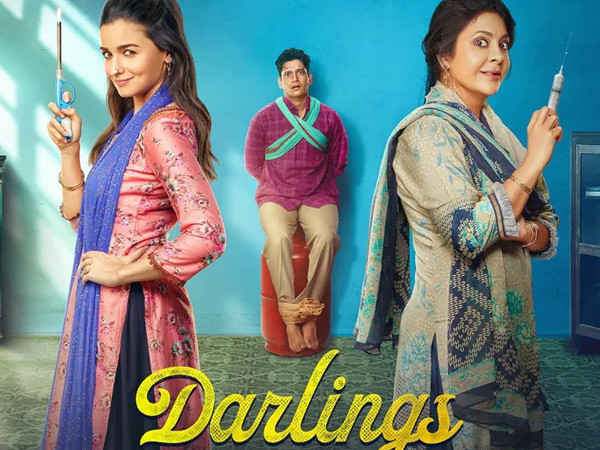 Going by a broad definition, domestic noir means a dramatic thriller set in a house with primarily female protagonists and revolves around relationships. Most are psychological in nature, with elements of both the horror and slasher genres thrown in. Darlings incorporates all of the above, albeit in a lighthearted way. It’s domestic noir with a fair sprinkling of dark comedy. It’s also a morality tale focusing on domestic violence. Domestic abuse is a much neglected feature of our society. It’s so much being normalised, especially among the lower-middle class and middle class homes, that it no longer raises eyebrows. People tend to see it as a “problem” between husband and wife, and no one ever intervenes in such cases. A point which is poignantly made in the film where the woman running a parlour in the downstairs home below Alia Bhatt’s and Vijay Varma’s house doesn’t even take a pause while applying mehendi on the hands of a young bride upon hearing a commotion.
Going by a broad definition, domestic noir means a dramatic thriller set in a house with primarily female protagonists and revolves around relationships. Most are psychological in nature, with elements of both the horror and slasher genres thrown in. Darlings incorporates all of the above, albeit in a lighthearted way. It’s domestic noir with a fair sprinkling of dark comedy. It’s also a morality tale focusing on domestic violence. Domestic abuse is a much neglected feature of our society. It’s so much being normalised, especially among the lower-middle class and middle class homes, that it no longer raises eyebrows. People tend to see it as a “problem” between husband and wife, and no one ever intervenes in such cases. A point which is poignantly made in the film where the woman running a parlour in the downstairs home below Alia Bhatt’s and Vijay Varma’s house doesn’t even take a pause while applying mehendi on the hands of a young bride upon hearing a commotion.
Badrunissa ‘Badru’ Shaikh (Alia Bhatt) is married to Hamza Shaikh (Vijay Varma), a senior TC with the railways, who happens to be a chronic alcoholic. Theirs has been a love marriage. He has the habit of randomly beating her up whenever he feels like it, initially blaming it on alcohol. She’s so submissive she forgives him each time and even makes the perfect omelette for him in the morning. She feels he’s going to give up drinking when he becomes a father. But her mother, Shamshunissa (Shefali Shah), who lives in the same chawl, doesn’t think so. Shamshunissa would like her daughter to be separated from her abusive husband. Badru is a romantic at heart and feels love will conquer all one day. Her eyes open after experiencing a tragedy. She decides to teach him a lesson, giving him a taste of his own medicine. That’s when things start spiralling out of hand, before fate takes a hand and sets things right again.
Domestic abuse not only leaves physical scars but physiological ones as well. The portions where Hamza systematically strikes a blow to Bardru’s dignity and self-esteem are hard-hitting and make him out to be the monster that he is. Given the amount of abuse she puts up with, her retaliation seems justified at all costs. But the film thankfully refrains from serving up revenge porn. The underlying message is that you’re in danger of becoming the very monster you’ve vowed to kill. And giving in to that impulse should be avoided for the sake of one’s own soul.
The drama is more or less confined to Badru and Hamza’s rather large house in a chawl. Apart from the three main characters, we also have Roshan Mathew playing Zulfi, a jack-of-all-trades who hides a secret of his own, a perpetually confused inspector (Vijay Maurya); and a strong, silent supporter (Rajesh Sharma), who happens to be a butcher. The ancillary characters, too, have a vital role to play and add to the story.
Vijay Varma plays the textbook abusive husband. He’s so casual while dealing violence and so normal otherwise that it’s hard to miss the evil that lurks in his heart. The character is a remorseless serial abuser with no justification for his actions, and the actor brings out all the nuances of the character with a natural ease. The film belongs to Alia Bhatt and Shefali Shah. They talk as much through their eyes as through dialogue, understanding each other’s gestures and body language perfectly. Their characters share a common streak of domestic abuse. As the film progresses, we see their stories converging. Both deal with their separate tragedies in their own ways. Their silent regard and support for each other is real and relatable. Kudos to both Alia and Shefali for letting go of their own selves and losing themselves in their characters, giving us an acting masterclass in the process.
The proceedings take on absurdist hues at times, but that sort of adds to the lure of the film. Watch Darlings for its message and for the fine acting displayed by the entire ensemble class.








